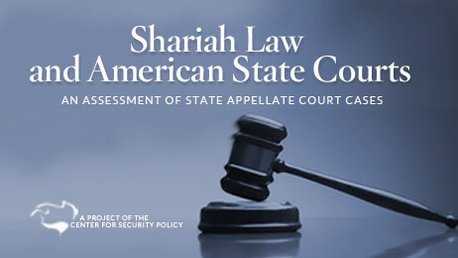Shariah Law and American State Courts: An Assessment of State Appellate Court Cases
This study evaluates published appellate legal cases that involved “conflict of law” issues between Shariah (Islamic law) and American state law.

7. Nationwide Resources Corp. v. Massabni, Massabni, and Zouheil, 143 Ariz. 460, 694 P. 2d 290 (Ct. App. 1984). 460, 694 P.2d 290 (Ct. App. 1984).
Shariah: Highly Relevant TCSY; ACSN
After obtaining a judgment against Defendants Bertha and Fadlo Massabni and Pierre Zouheil, Plaintiff Nationwide brought an action to garnish a promissory note for monies owed to Defendant Zouheil. Mr. Zouheil claimed that the promissory note was community property belonging to him and his wife (both Syrian Christians); and therefore not subject to garnishment by Nationwide. Nationwide contended that the promissory note was the separate property of only Mr. Zouheil and subject to garnishment. The trial court, following Nationwide’s suggestion, applied Moroccan Islamic law to determine the nature of the promissory note as separate or community property despite the fact that the Zouheils were neither Muslims nor Moroccan citizens. In reviewing the trial court’s decision, the Arizona appellate court applied Syrian Christian law and determined that the promissory note was Defendant Zouheil’s separate property. The application of Syrian Christian law, which does not allow couples to acquire community property simply by virtue of the existence of their marriage, directly conflicted with Arizona law which starts with the presumption that all property acquired by either spouse during marriage is community property.
8. In re Custody of R., minor child, No. 21565-9-II (Wash. Ct. App. 1997).
Shariah: Highly Relevant TCSY; ACSN
Mr. Noordin and Ms. Abdulla had a child, R., out of wedlock, but were later married in Malaysia. Neither Mr. Noordin nor Ms. Abdulla were citizens of the United States. While the couple was residing in the Philippines, Ms. Abdulla filed for an annulment in Philippine civil court; and Mr. Noordin was granted talaq, or Islamic divorce, and given custody of R. by a Sharia court in the Philippines. Subsequently, the Philippine civil court ruled that the Sharia court lacked jurisdiction, granted custody of R. to Ms. Abdulla, and allowed her to take R. out of the country. Ms. Abdulla took R. to the United States without notifying Mr. Noordin.
Mr. Noordin later moved to the United States, filed an action in Washington state court, requested that the Sharia court’s ruling be enforced, and asked the court to give him custody of R. The trial court showed little patience in working through the issue of whether the Sharia court had jurisdiction to decide who should be R.’s custodian, enforced the Sharia court’s ruling, and gave Mr. Noordin custody of R. The Washington appellate court reversed the trial court and ordered the trial court to determine whether the Sharia court had jurisdic-tion to determine R.’s custodian. The Washington appellate court also stated that if the Sharia court had jurisdiction to determine R.’s custodian, Ms. Abdulla could challenge the Sharia court’s order by proving that the Sharia court’s proceedings violated Washington public policy or that the foreign court did not consider the best interests of the child when it awarded custody.
9. Tazziz v. Tazziz, No. 88-P-941 (Mass. App. Ct. 1988).
Shariah: Highly Relevant TCSY; ACSNI
Ismail Tazziz (father) and Pamela Tazziz (mother) lived together as husband and wife in East Jerusalem for 22 years. The father was a Jordanian citizen with an Israeli ID card; and the mother was a dual citizen of Jordan and the United States and had an Israeli ID card. The couple had several minor children. All of the couple’s minor children were United States citizens by virtue of being born abroad to an American mother. The mother took three of the couple’s minor children to Massachusetts without the father’s consent and filed suit in Massachusetts for custody of the minor children. Two months after the mother filed for custody in Massachusetts, the father filed for custody in an Israeli Sharia court.
The Massachusetts trial court dismissed the mother’s complaint without considering the best interests of the children. The trial court appeared to not realize that it had discretion to hear the mother’s suit for custody. The appellate court sent the mother’s case back to the trial court and instructed the trial court to consider a variety of factors in order to protect the children’s interests and to evaluate whether the Sharia court would consider the best interests of the children when awarding custody.
10. Rhodes v. ITT Sheraton Corp., 9 Mass. L. Rptr. 355 (Mass. 1999).
Shariah: Highly Relevant TCSN; ACSNA
Plaintiff Rhodes, a non-Muslim woman, was on vacation at a Sheraton resort in Jeddah, Saudia Arabia, and suffered severe spinal injuries after she dove into the resort’s lagoon and hit her head on a coral structure. Plaintiff filed her suit in a Maryland court for her injuries. Defendant ITT Sheraton requested that the Maryland court dismiss Plaintiff’s suit, under a mechanism called forum non conveniens, because Saudi Arabia represented a more convenient forum in which to try the suit. The Massachusetts court refused to dismiss Plaintiff’s suit and deemed Saudi Arabia an inadequate forum because, among other deficiencies, Saudi law, which is the application of Sharia as the law of the land, exhibits a systemic bias against women and non-Muslims.
- Frank Gaffney departs CSP after 36 years - September 27, 2024
- LIVE NOW – Weaponization of US Government Symposium - April 9, 2024
- CSP author of “Big Intel” is American Thought Leaders guest on Epoch TV - February 23, 2024
